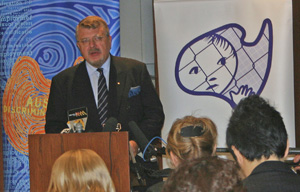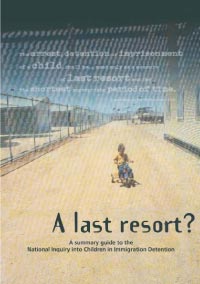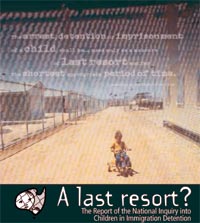HREOC Annual Report 2003-2004 : Chapter 8: Human Rights
Human Rights and Equal Opportunity Commission
Annual Report 2003 - 2004
Chapter 8: Human Rights

Dr Sev Ozdowski, OAM
Human Rights Commissioner
Statement from the Commissioner
"A stand can be made against invasion by an army; no stand can be made against invasion by an idea". (Victor Hugo)
There is some evidence to suggest that within the Australian community, the idea that it is unacceptable for a government to maintain an immigration detention regime which provides for the long-term incarceration of children behind razor wire, is finally the prevailing view. The actions of the government in relaxing their hard line stance on immigration detention, as far as children are concerned, are possibly the most conclusive proof of this statement. Recent comments by the Leader of the Opposition that, if elected, a Labor Government would ensure that no children were kept in immigration detention also reinforces this perception.
As prominent Liberal backbencher Bruce Baird observed, in a recent newspaper article concerning the government's policy shift regarding TPV holders, as being prompted by: "a sea change in public opinion; like most things, the change occurs in the community and then it filters through to MPs".
Efforts by the current Minister for Immigration to release many children into the general community provide further evidence that public opinion from the 'post-Tampa period' to now, has undergone a significant shift. Other examples include:
- Sydney Morning Herald (SMH) polling 'post-Tampa' showed that 75 percent of those surveyed supported the government's actions;
- Current SMH polling shows that 70-75 percent believe that children should be released from immigration detention;
- The SMH poll of 19 January 2004 regarding support for mandatory immigration detention revealed that out of 6355 votes, 35 percent support mandatory detention, 61 percent are opposed and four percent are undecided.
Like all complex social issues, there are a great number of factors contributing to this change. These range from the absence of significant numbers of new boat arrivals, to the increasing effectiveness and number of refugee advocacy groups. It is difficult to pinpoint one critical agent of change, nevertheless, I am confident that any future analysis will attribute a prominent role to the National Inquiry into Children in Immigration Detention. This observation is not prompted by any hubris on my part, but rather because it contains a vital clue as to what constitutes the most appropriate mix of ingredients for a well functioning civil society. But more on that later.
The official response from the federal Government to 'A last resort?' The Report of The National Inquiry into Children in Immigration Detention focussed only on two themes: the report is backward looking and things are constantly improving; and DIMIA was denied 'complete procedural fairness'. It is worth noting, that in a report of this size (894 pages - 17 chapters) and complexity, the absence of any identified factual error demonstrates the attention to detail and care taken when compiling the report. Despite the official response, the tabling of the Report can reasonably be said to have accelerated the release of children and families from detention.
On 11 June 2004, the Prime Minister publicly declared: "It is the government's intention to dwindle the number of children in immigration detention to zero". While a small measure of satisfaction can be derived from this outcome, clearly the job remains essentially unfinished while the current legislative framework remains in place.
Finally, let me briefly return to my earlier point concerning the importance of this Inquiry process to the integrity of our civil society. I am convinced that Inquiries such as this are central to the ongoing task of human rights education in the broader community. When one considers the number of people exposed to the workings of the Inquiry in the two years of its information-gathering phase, the internet access to the transcripts of evidence, the media coverage and the public hearings - all of this represents a significant level of public discussion about human rights principles. In turn, this leads to an interest in, and understanding of, human rights issues that goes far beyond the immediate subject matter.
Since the release of the report, I have conducted public meetings detailing the Inquiry's findings in Brisbane, Sydney, Melbourne, Adelaide, Perth, Darwin, Alice Springs, Hobart and Launceston. All meetings attracted large audiences and significant media attention.
Combine this interest with the media coverage post-release, comments from parliamentarians and journal analysis, and you soon realise that the Inquiry process has enabled the Commission to reach out to a very broad cross-section of the general community indeed. Statistical evidence for this proposition is supported by the 64,126 page views that the 'A last resort?' pages on the website received from 13 May to 30 June 2004.
The capacity of the Commission to successfully undertake such Inquiries has to be seen in the political and historical context of Australian civil society. The Commission's effectiveness and autonomy is immeasurably strengthened because it operates in a country which possesses a system of pluralistic governance and rule of law. Like most effective national human rights institutions it is sustained by the clear separation of powers and strong democratic traditions and processes - a civil society which emanates unity of voice through diversity of opinion.
Non-government organisations played a key role in the conduct of the Inquiry and their untiring efforts in the course of the Inquiry not only contributed to the outcome, but also ensured that we approached our task with great rigour and vitality.
It is for all these reasons that I am convinced that national human rights Inquiries perform a human rights function that goes far beyond the importance of the subject matter itself.
Research and Policy
A last resort? The report of the National Inquiry into Children in Immigration Detention
 The National Inquiry into Children in Immigration Detention was announced on 28 November 2001. Its primary purpose was to ascertain whether the immigration detention system as it applied to children and the laws, executive acts and practices giving effect to that policy, comply with Australia's obligations under the UN Convention on the Rights of the Child.
The National Inquiry into Children in Immigration Detention was announced on 28 November 2001. Its primary purpose was to ascertain whether the immigration detention system as it applied to children and the laws, executive acts and practices giving effect to that policy, comply with Australia's obligations under the UN Convention on the Rights of the Child.
The Inquiry gathered evidence regarding the treatment of children in immigration detention centres for the period covering 1999 - 2002. The Inquiry heard from all relevant parties including: children and parents who were, or are in, immigration detention; the Department of Immigration and Multicultural and Indigenous Affairs (DIMIA) and its detention centre staff; Australasian Correctional Management (ACM) and its detention centre staff; state child protection authorities; organisations providing services to current and former detainee children; professional organisations; non-government organisations and individuals.
The Inquiry collected evidence in a variety of different ways including: visits to all Australian detention centres; a public submission process (346 public submissions, 64 confidential submissions); public hearings (68 public sessions - 114 witnesses, 17 confidential sessions - 41 witnesses) and focus groups (29 groups). The Inquiry also obtained access to primary documents relating to the management of detention centres and the circumstances surrounding particular children and families who had been in detention for prolonged periods of time. DIMIA and ACM provided oral and written evidence and submissions. They had two opportunities to provide comments and submissions on the draft of the report and a third opportunity to provide information regarding actions taken in response to the Inquiry's findings and recommendations. The Inquiry carefully balanced and considered those comments and all other evidence when making its findings.
A report from the Inquiry titled 'A last resort?' was tabled in federal Parliament on 13 May 2004.
Major findings
The Inquiry made the following major findings in relation to Australia's mandatory immigration detention system as it applied to children who arrived in Australia without a visa (unauthorised arrivals) over the period 1999-2002:
- Australia's immigration detention laws, as administered by the Commonwealth, and applied to unauthorised arrival children, create a detention system that is fundamentally inconsistent with the Convention on the Rights of the Child (CRC).
In particular, Australia's mandatory detention system fails to ensure that:
- detention is a measure of last resort, for the shortest appropriate period of time and subject to effective independent review (CRC, article 37(b), (d))
- the best interests of the child are a primary consideration in all actions concerning children (CRC, article 3(1))
- children are treated with humanity and respect for their inherent dignity (CRC, article 37(c))
- children seeking asylum receive appropriate assistance (CRC, article 22(1)) to enjoy, 'to the maximum extent possible' their right to development (CRC, article 6(2)) and their right to live in 'an environment which fosters the health, self-respect and dignity' of children in order to ensure recovery from past torture and trauma (CRC, article 39)
- children in immigration detention for long periods of time are at high risk of serious mental harm. The Commonwealth's failure to implement the repeated recommendations by mental health professionals that certain children be removed from the detention environment with their parents, amounted to cruel, inhumane and degrading treatment of those children in detention (CRC, article 37(a) - Chapter 9).
 At various times between 1999 and 2002, children in immigration detention were not in a position to fully enjoy the following rights:
At various times between 1999 and 2002, children in immigration detention were not in a position to fully enjoy the following rights:
- the right to be protected from all forms of physical or mental violence (CRC, article 19(1) - Chapter 8)
- the right to enjoy the highest attainable standard of physical and mental health (CRC, article 24(1) - Chapters 9, 10)
- the right of children with disabilities to 'enjoy a full and decent life, in conditions which ensure dignity, promote self-reliance and facilitate the child's active participation in the community' (CRC, article 23(1) - Chapter 11)
- the right to an appropriate education on the basis of equal opportunity (CRC, article 28(1) - Chapter 12)
- the right of unaccompanied children to receive special protection and assistance to ensure the enjoyment of all rights under the CRC (CRC, article 20(1) - Chapters 6, 7, 14).
Recommendations
The Inquiry made the following recommendations:
1. Children in immigration detention centres and residential housing projects, as at the date of the tabling of this report, should be released with their parents, as soon as possible, but no later than four weeks after tabling (June 10).
The Minister and the Department of Immigration and Multicultural and Indigenous Affairs (the Department) can effect this recommendation within the current legislative framework by one of the following methods:
- transfer into the community (home-based detention)
- the exercise of Ministerial discretion to grant humanitarian visas pursuant to section 417 of the Migration Act 1958 (Cth) (the Migration Act)
- the grant of bridging visas (appropriate reporting conditions may be imposed).
If one or more parents are assessed to be a high security risk, the Department should seek the urgent advice of the relevant child protection authorities regarding the best interests of the child and implement that advice.
2. Australia's immigration detention laws should be amended, as a matter of urgency, to comply with the Convention on the Rights of the Child. In particular, the new laws should incorporate the following minimum features:
- there should be a presumption against the detention of children for immigration purposes
- a court or independent tribunal should assess whether there is a need to detain children for immigration purposes within 72 hours of any initial detention (for example for the purposes of health, identity or security checks)
- there should be prompt and periodic review by a court of the legality of continuing detention of children for immigration purposes.
All courts and independent tribunals should be guided by the following principles:
- detention of children must be a measure of last resort and for the shortest appropriate period of time
- the best interests of the child must be a primary consideration
- the preservation of family unity
- special protection and assistance for unaccompanied children.
Bridging visa regulations for unauthorised arrivals should be amended so as to provide a readily available mechanism for the release of children and their parents.
3. An independent guardian should be appointed for unaccompanied children and they should receive appropriate support.
4. Minimum standards of treatment for children in immigration detention should be codified in legislation.
5. There should be a review of the impact on children of legislation that creates 'excised offshore places' and the 'Pacific Solution'.
Education and Promotion
 As indicated in the Human Rights Commissioner's opening statement concerning the Inquiry into Children in Immigration Detention, the Commission sees the inquiry process as an important educative tool in its own right. Evidence for this can be found in:
As indicated in the Human Rights Commissioner's opening statement concerning the Inquiry into Children in Immigration Detention, the Commission sees the inquiry process as an important educative tool in its own right. Evidence for this can be found in:
- the release of the report 'A last resort?' in community guide format, CD-Rom, a variety of internet applications, as well as the traditional hard-copy book format
- the creation of an interactive internet-based teaching module for use by schools
- a series of Australia-wide community education forums featuring 'A last resort?' Centres visited included Brisbane, Sydney, Melbourne, Adelaide, Perth, Darwin, Alice Springs, Hobart and Launceston
- several key-note addresses to professional bodies with special interests, such as mental health.
Legislative Development
Recommendation 2 of 'A last resort?' stipulates: 'Australia's immigration detention laws should be amended, as a matter of urgency, to comply with the Convention on the Rights of the Child. In particular, the new laws should incorporate the following minimum features.'
The report proceeds to outline in detail over 19 pages (pp860-879) how the parliament should amend the law to make our immigration regime CRC compliant. Clearly, should parliament decide to proceed down this path, more work will be required, but this material provides an excellent starting point.
In any event, parliament at the very least should enact legislation to codify the minimum standard of treatment of children in detention centres - an indication of the desirability of such a course and the nature of the change required is detailed from pages 877-880.
International Activities
In the year under review, the Human Rights Commissioner attended a number of key international human rights conferences. These included:
- The 18th Biennial Conference of Lawasia 2003 held in Tokyo, 1-5 September 2003. The Human Rights Commissioner was keynote speaker for the session on Human Rights Institutions in the Asia Pacific and Implementation of International Human Rights Conventions in National Courts.
- The XII Workshop on regional cooperation for the promotion and protection of human rights in the Asia-Pacific region (Office of the UN High Commissioner for Human Rights) held in Doha, Qatar, 2-4 March 2004. Prior to the workshop, on 1 March there was a meeting of National Human Rights Institutions (NHRIs) and non-government organisations (NGOs) to caucus on the issues of relevance to be discussed at the workshop. The Workshop was well attended with 36 countries from the Asia Pacific region (plus Palestine as an observer) participating. In addition, there were participating NHRIs, NGOs and UNHCHR (approx. 100 officials in total). The Human Rights Commissioner was elected Rapporteur for the session dealing with human rights education.
Speeches
A selection of public addresses made by the Human Rights Commissioner during 2003-04 is listed below. Some speeches can be accessed on the Commission's website at: www.humanrights.gov.au/speeches/human_rights/index.html
World Refugee Day speech at the Brisbane Rally, 19 June 2004 and the Canberra Rally, 20 June 2004.
Doctor of Social Science Honoris Causa Acceptance speech at the RMIT University Honorary Awards Conferring Ceremony, Melbourne, 7 May 2004.
Armenia to Rwanda - Genocide in the 20th Century - Has humanity learnt anything? speech at the Armenian Genocide Commemorative Lecture, NSW Parliament Theatrette, 29 April 2004.
The local face of global justice policy lecture to the RMIT students of the Department of Justice and Youth Studies, Melbourne, 16 April 2004.
Twelfth Workshop on Regional Cooperation for the Promotion and Protection of Human Rights in the Asia-Pacific Region Working Group on Human Rights Education Report, Consultation of Non-Governmental Actors, Doha, Qatar, 1 March 2004.
The Importance of Australian Community in Protection of Human Rights during the War against Terrorism presentation to the Human Rights: New Paradigms and new Responsibilities Conference held at the University of Technology in Sydney, 5 December 2003.
Long-term immigration detention and mental health speech, Diversity in Health 2003, Sydney, October 2003.
Human Rights as a secular guide to community relations address, Poverty & Power - What makes you rich, what makes you poor, Mornington Peninsula Shire Conference, October 2003.
Immigration Detention - the Current Position speech, Monash Institute for the Study of Global Movements, Monash University, Clayton Campus, October 2003.
The Clash Of Civilisations - How The Contemporary International Environment Teaches Us To Better Manage Diversity In Australia speech at the Managing Diversity Conference, Melbourne, October 2003.
Long-term detention and mental health speech at the ANZAPPL Annual Congress, Fremantle, Western Australia, September 2003.
What makes a National Human Rights Institution Independent and why should we care? speech at the 18th Biennial Conference of Lawasia, Tokyo, Japan, September 2003.
Presentation to the Kyoto Bar Association speech at Kyoto Bar Association, Japan, September 2003.
The Relevance of Human Rights in Contemporary Australia speech at the Activating Human Rights and Diversity Conference, Byron Bay, July 2003.
19 November 2004
